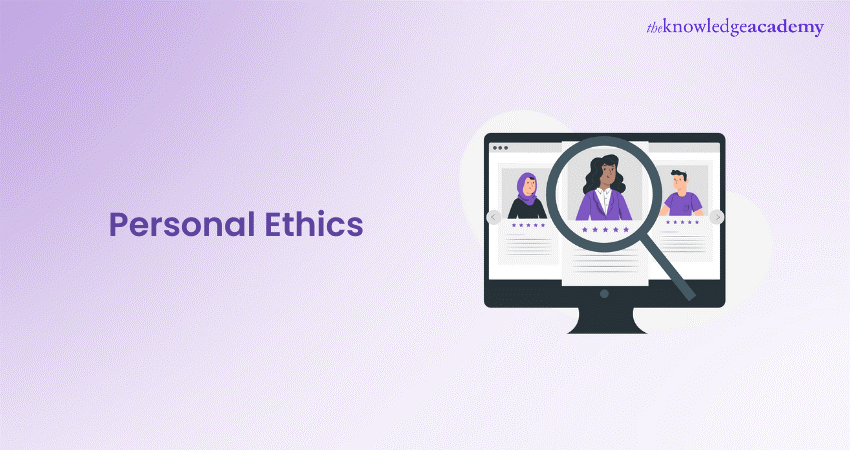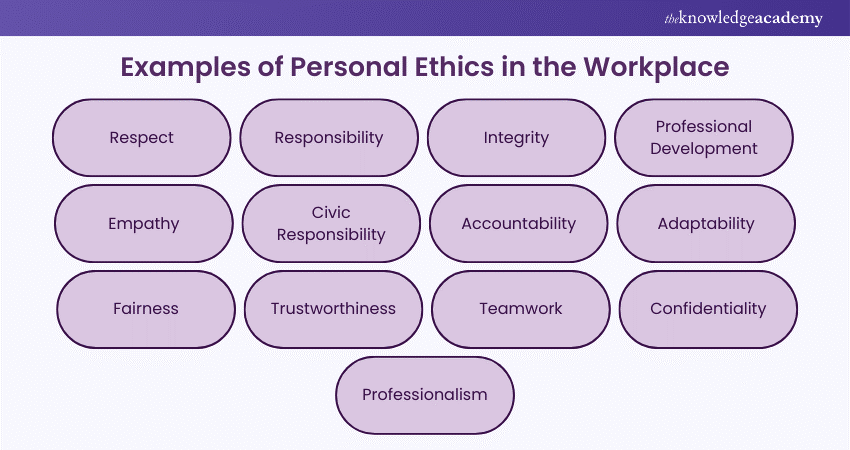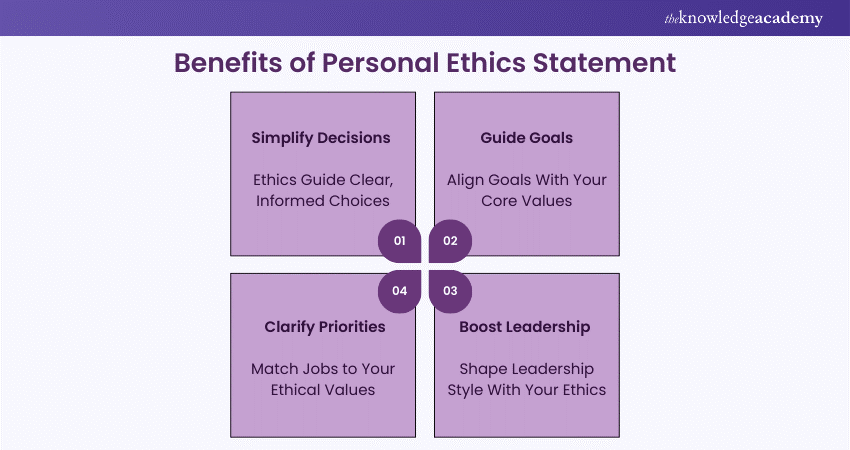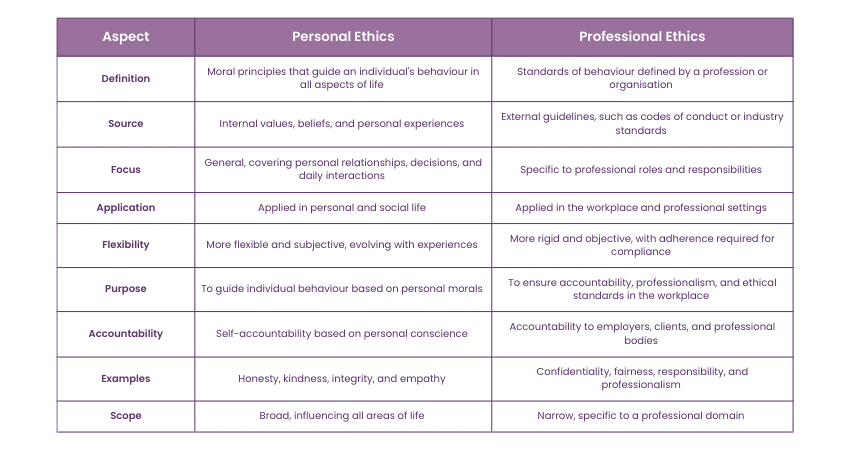We may not have the course you’re looking for. If you enquire or give us a call on +357 26030221 and speak to our training experts, we may still be able to help with your training requirements.
Training Outcomes Within Your Budget!
We ensure quality, budget-alignment, and timely delivery by our expert instructors.

What drives your decisions every day? For some, it's a strong moral compass; for others, it's that gut feeling you just can't ignore. At the heart of it all are Personal Ethics—those invisible rules that reflect our deepest values and beliefs. They help us tackle life's challenges and shape how we connect with others.
In this blog, we're diving into the world of Personal Ethics. We'll explore what they are, why they matter, and how they can lead to a more fulfilling and respectful life. Ready to discover how embracing Personal Ethics can transform your decisions and relationships?
Table of Contents
1) What are Personal Ethics?
2) The Importance of Personal Ethics
3) Examples of Personal Ethics in the Workplace
4) Benefits of Personal Ethics Statement
5) Difference Between Personal and Professional Ethics
6) Conclusion
What are Personal Ethics?
Personal Ethics are the moral standards that help individuals determine between good and bad actions. These principles influence everyday choices, behaviours, and interactions with others. Unlike societal rules, Personal Ethics are internal and shaped by factors such as upbringing, culture, religion, and individual experiences.
Some of the key components that make an individual's moral direction include:
a) Honesty: Being truthful and sincere in actions
b) Integrity: Uphold moral ethics firmly
c) Respect: Value other’s opinions and rights
d) Empathy: Understand and share other’s emotions genuinely
e) Unbiased: Make fair decisions without prejudice
f) Disciplined: Maintain self-control
g) Responsibility: Fulfilling commitments reliably
h) Trustworthiness: Be reliable and keep promises
i) Open-mindedness: Embracing new ideas
j) Adaptability: Adjusting to changes and challenges
The Importance of Personal Ethics
Personal Ethics shape one’s character and behaviour. Here are some of the pointers that tell its importance:
a) Lead Effectively: They empower leaders to lead consistently following a transparent and respected ethical code. This boosts confidence and trust within the team, motivating others to follow the leader and make positive contributions to the organisation.
b) Build Trust and Support: Persistent ethical behaviour in all situations builds trust and credibility among peers, improving the dependability and respect of leaders and professionals.
c) Provides Solid Foundation: Having strong Personal Ethics assists individuals in dealing with difficult events by directing their decisions and behaviours in harmony with a defined moral compass.
d) Streamline Decision-making Process: Professionals with solid ethical principles can make decisions more swiftly and easily, in accordance with their own values in both personal and professional domains.
e) Set Behavioural Standards: Ethics form a benchmark for proper behaviour, leading people towards ethical choices and actions in both professional and personal spheres of life.
f) Motivate Others: People with strong Personal Ethics are often self-motivated and are ready to go the extra mile to accomplish their goals effectively.
Learn to build trust in your organisation with our Business Ethics Course – Register now!
Examples of Personal Ethics in the Workplace
Personal Ethics can greatly impact one’s professional and personal life. Here are some of the Personal Ethics examples of having a good morale in the workplace:

1) Respect
Respect remains essential for successful communication and cooperation. When respect is a core value in the workspace, employees often experience greater job satisfaction because it facilitates a positive and supportive environment.
2) Responsibility
Responsibility is another critical element of establishing trust within organisations. Taking responsibility for your actions and keeping promises can greatly improve the success of your team.
3) Integrity
Companies with the strongest ethical cultures outperform those with weaker ethical cultures by 50%, as per LRN Ethical Culture Report 2024. This also decreases misconducts from employees and management.
4) Professional Development
Continuous learning and growth are greatly appreciated in the workplace. It increases motivation and flexibility and improves employee performance, making professional development a crucial personal value.
5) Empathy
Having empathy as a leader is vital for creating a supportive and communicative work environment. It enhances collaboration, resolves disputes, and boosts the overall involvement of your employees.
6) Civic Responsibility
Participating in civic duties, such as volunteering and environmental initiatives, boosts a company's societal influence and enhances its reputation.
7) Accountability
Fostering responsibility promotes visibility and confidence among team members, which is essential for keeping a positive and moral work environment.
8) Adaptability
Being able to adapt to new situations and events is essential in ever-changing workplaces. Flexible employees have a big impact on team effectiveness and the ability of an organisation to bounce back from challenges.
9) Fairness
Fair treatment for all employees promotes trust and boosts their morale. It emphasises the importance of making decisions grounded in merit and moral principles.
10) Trustworthiness
Being honest and reliable establishes a strong professional relationship and fosters effective teamwork.
11) Teamwork
Successful teamwork relies on working together, communicating effectively, and displaying mutual respect. Teamwork is also essential for attaining success in the workplace, as it enhances productivity and promotes innovation.
12) Confidentiality
Maintaining confidentiality is important for safeguarding sensitive information and preserving trust. It yields ethical and legal norms in the workplace.
13) Professionalism
Professionalism, which includes respect, integrity, and accountability, enhances credibility and supports career growth, making it a cornerstone of Personal Ethics in the workplace.
Create a respectful workplace with our Ethics in Workplace Training – Join today!
Benefits of Personal Ethics Statement
A Personal Ethics statement offers clarity and direction to individuals in both personal and professional life. Here are some of the benefits:

1) Simplify Decision making
Crafting a Personal Ethics statement not only clarifies your priorities but also simplifies decision-making. This is particularly crucial for leaders and high-level executives who frequently face complex choices. By establishing a clear set of criteria, you can more easily evaluate your options and make informed decisions.
2) Enhance Goal Setting
Once you select your focus areas, your Personal Ethics statement can steer your developmental goals. You can pinpoint opportunities and prepare future steps to pursue by identifying your core values. This clarity will help you align with your principles as you grow personally and professionally.
3) Clarify Priorities
Understanding your core values can advance your career. A Personal Ethics statement defines your priorities. If you value helping others, you’ll succeed in roles focused on service. If you prioritise productivity, you might excel as a business leader. These insights help you pick jobs that align with your ethics and avoid conflicts.
4) Develop Leadership Skills
Creating a Personal Ethics statement can immensely boost your leadership skills, particularly when pursuing roles or positions that demand a robust ethical foundation. Understanding your core values and principles can help you choose a leadership style that promotes team growth and success.
Difference Between Personal and Professional Ethics
Here are the difference between Personal and Professional Ethics:

Conclusion
Remember, Personal Ethics aren't just about making the right choices—they're about living a life that aligns with who you truly are. So, take a moment to reflect on your own ethical compass and consider how it can lead you to a more fulfilling and harmonious life. Here's to making decisions that not only benefit you but also uplift those around you!
Strengthen your core values of life with our Personal Ethics Training today!
Frequently Asked Questions

Personal Ethics can be developed via a combination of educational background, cultural touch, upbringing, and life experiences. It can evolve over time as one reflects on values and lessons learned from life events.

Personal Ethics are impacted by religion, qualifications, family, and personal experiences. Social norms, rules and regulations also play a significant role in shaping ethical beliefs.

The Knowledge Academy takes global learning to new heights, offering over 30,000 online courses across 490+ locations in 220 countries. This expansive reach ensures accessibility and convenience for learners worldwide.
Alongside our diverse Online Course Catalogue, encompassing 19 major categories, we go the extra mile by providing a plethora of free educational Online Resources like News updates, Blogs, videos, webinars, and interview questions. Tailoring learning experiences further, professionals can maximise value with customisable Course Bundles of TKA.

The Knowledge Academy’s Knowledge Pass, a prepaid voucher, adds another layer of flexibility, allowing course bookings over a 12-month period. Join us on a journey where education knows no bounds.

The Knowledge Academy offers various Employee Engagement Training, including the Personal Ethics Training, Employee Training And Development Course, and Ethics In Workplace Training. These courses cater to different skill levels, providing comprehensive insights into What is Business Ethics.
Our HR Resources Blogs cover a range of topics related to Ethics, offering valuable resources, best practices, and industry insights. Whether you are a beginner or looking to advance your HR Resources skills, The Knowledge Academy's diverse courses and informative blogs have got you covered.







 Top Rated Course
Top Rated Course




 If you wish to make any changes to your course, please
If you wish to make any changes to your course, please


